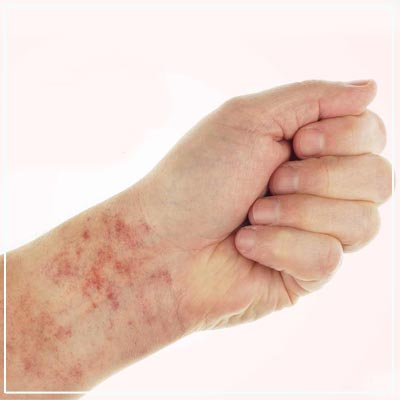Pityriasis Rosea
What Is Pityriasis Rosea?
Pityriasis rosea is a rash that appears as a big, round or oval, slightly larger, scaly area on the chest, abdomen, or back, and less frequently on the face, head, or near the genitals. This patch, also known as a herald patch, can be up to 10 cm large.
Some persons report headaches, weariness, fever, decreased appetite, or sore throat before the herald patch develops. Pityriasis rosea can produce itching, which can be intense at times, especially while exercising, exposed to heat, or under stressful conditions.
The patches are normally pinkish red in light-skinned people and grey, dark brown, or black in dark-skinned people. It normally goes away on its own after about ten weeks. It is not contagious, and it leaves no markings or scars in most people after it heals.

Who Gets It?
It can affect anyone of any age, although it most typically affects people between the ages of 10 and 35. Pityriasis rosea is a condition that affects both men and women equally.
What causes it?
Although the precise causes are unknown, it is considered to be caused by a viral infection, namely by certain uncommon forms of the herpes virus. Certain medications can cause pityriasis rosea. Angiotensin-converting enzyme inhibitors, nonsteroidal anti-inflammatory medicines, hydrochlorothiazide, imatinib, clozapine, metronidazole, terbinafine, and atypical antipsychotics are examples of these medications.
Complications
Pityriasis rosea complications are uncommon. After the rash has healed, the only complications are extreme itching and/or long-lasting brown blotches on dark skin.
How Is It Diagnosed?
Physical examination, Blood test, or Biopsy.
How Is It Treated?
Pityriasis rosea is normally self-limiting, requires no therapy, and resolves on its own. If the rash does not produce any major symptoms, no treatment is required. Without medical intervention, pityriasis rosea normally clears up on its own in 6–9 weeks.
Your doctor may advise you to try the following to relieve itching:
- Calamine lotion or zinc oxide are examples of over-the-counter topical medicines.
- Antihistamines are commonly used to treat allergies (to treat rashes and itching)
- Showering in lukewarm water baths is advised
In some circumstances, your doctor may prescribe medications such as corticosteroids, which reduce itching and swelling, or acyclovir, an antiviral that treats herpes.
Reduced exercise and avoiding hot showers and baths may also be advised.
For more information & consultation on Pityriasis Rosea treatment, visit VIVA Aesthetic Clinic at Opera House or contact us on 022 3573 1556 | 93245 89084 or simply fill in your name and number & one of our team member will get in touch with you soon. Our team of experts along with Dr. Deepam Shah, MD. DNB. FAM – Dermatologist, Cosmetologist & Hair Transplant Surgeon, will help you out in understanding your problem and guide you through every stage of your treatment.
At Viva Aesthetic Clinic, we offer Hair transplant, Aesthetic treatments and skin care with the help of latest technology, world class procedures and a dedicated team led by Dr.Deepam Shah . We are your one-stop clinic in India for comprehensive Hair Restoration, cosmetic laser treatment and skincare solutions.
